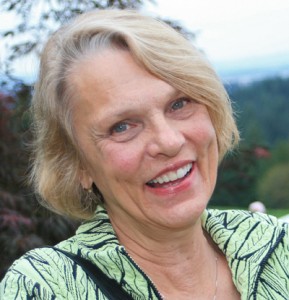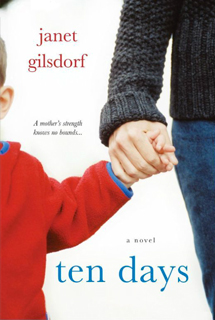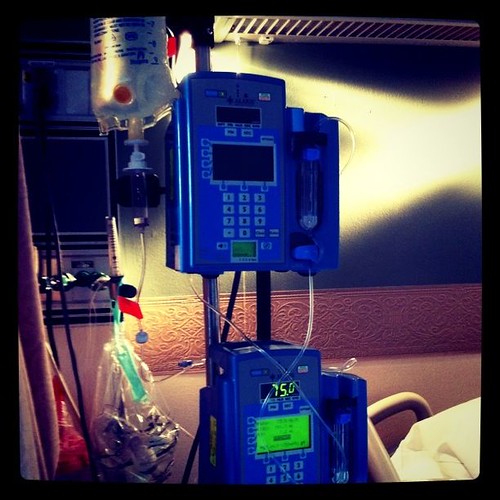 Janet Gilsdorf doesn’t watch movies or television. And she doesn’t do Facebook. I’ve heard her say more than once that it’s crucial to decide what’s most important in life and make careful choices about how you spend your time. A Professor of Pediatrics and Infectious Diseases at the University of Michigan who sees patients, runs a research lab, and trains medical students, Gilsdorf chooses to spend what little free time she has writing fiction. Focusing her energy this way has paid off; her first novel, Ten Days (Kensington), was published this September. It follows a situation deeply familiar to Gilsdorf: a baby falls seriously ill with meningitis. His mother, father, and older brother come under great pressure while they wait, and hope, for his recovery.
Janet Gilsdorf doesn’t watch movies or television. And she doesn’t do Facebook. I’ve heard her say more than once that it’s crucial to decide what’s most important in life and make careful choices about how you spend your time. A Professor of Pediatrics and Infectious Diseases at the University of Michigan who sees patients, runs a research lab, and trains medical students, Gilsdorf chooses to spend what little free time she has writing fiction. Focusing her energy this way has paid off; her first novel, Ten Days (Kensington), was published this September. It follows a situation deeply familiar to Gilsdorf: a baby falls seriously ill with meningitis. His mother, father, and older brother come under great pressure while they wait, and hope, for his recovery.
Gilsdorf is also the author of a memoir, Inside/Outside: A Physician’s Journey with Breast Cancer (University of Michigan Press), and several personal essays. I spoke with her in her office at the medical school in July.
Interview
Danielle LaVaque-Manty: You were a doctor and scientist for many years before you began doing any creative writing, and you still practice medicine and conduct research. What led you to begin writing?
Janet Gilsdorf: I had been thinking about my patients, about all the things I had learned from them in so many different realms, and I thought I’d like to find a way to express some of that. While I was trying to figure out how, I ran into a friend who asked if I had ever thought about writing. When I said I had, she said, “Well, I just joined a writing group, so why don’t you come with me next time?” So I joined this writing group, having never written anything creative.
That writing group has been around a long time. I’ve been in it for five years, and I’m one of the newer people. How long ago did you join?
It’s been at least fifteen, maybe twenty years. I had done a lot of scientific writing, but no creative writing, not even in college. So when it was my turn to present my first story, I remember I had written something about a gym teacher, and I was describing a vent on the back of her gray flannel jacket. And it was in her point of view. And someone in the group said, “Janet, that’s a point-of-view problem because she can’t see the back of her jacket.” I thought, point of view…what’s that? So I went down to Border’s and bought a book on writing. I started off from a very, very basic place.
 How does writing fit into your current professional life? Do you feel like you’re juggling two careers?
How does writing fit into your current professional life? Do you feel like you’re juggling two careers?
I’ve always had several careers. I have my science career and my teaching career and my patient care career, and then there’s all the administrative stuff. So this is adding something else to all that. I’ve never felt like I’ve had enough time for everything I wanted to do, but it’s about prioritizing. And being efficient. I’ve learned to be very efficient.
How does your analytical, scientific mind inform your creative impulses? Do the two relate or cross-pollinate, other than in subject matter?
Surprising as it may seem, the scientific process, while analytical for sure, also requires some degree of creativity. My son, the artist, and I discuss this from time to time. As a scientist and as a writer, I need to look over the horizon and around corners. I need to ask “What if…?” and “What’s going on here?” Both my scientific and literary endeavors require attention to detail, expansive thinking, discipline, and following established core principles (albeit different details, thinking, discipline, and principles). In short, daydreaming about possibilities serves me well in both spheres of my life.
Where did the idea for your novel Ten Days come from?
I wanted to explore the idea of what prompts parents to take their children to the doctor when they’re sick. Usually they do it very right, and the children are taken to a medical facility in a timely fashion and things work out okay. But what if they don’t? And what if one of the parents is a physician? Because in dealing with physician parents, I’ve found that they are a different kind of patient family.
In what ways?
Many of them have a hard time distinguishing between their role as a parent and their role as a physician. And I always tell them, especially when there’s a little bit of tension there—and I might have had a character say something like this in the novel—“You know, your child has many physicians who are going to take excellent medical care of him or her, but your child only has one dad or mom, and they need their dad and mom desperately.” That’s a difficulty that physicians have; they’re so used to being in control, especially in medical situations, that they have a hard time letting go. And then I’ve seen, in all kinds of families, how devastating a child’s illness can be for everything in their family’s life.
Do you identify more with the mother in your story, Anna, or with Jake, as he’s a doctor?
I identify with both of them in different ways. Certainly, I identify with Anna, because she’s a mom, and I also have two boys, about the same distance apart in age as Eddie and Chris. So I think there are some echoes of my own experience as a mother in her, but fortunately neither of my children have been seriously ill. I’ve never really experienced that directly, being a physician parent of an ill child. But I have been a patient and a physician at the same time, and there are similarities there.
The book is told from three perspectives: Anna’s, Jake’s and that of their daycare provider, Rosemary, whose business comes under scrutiny when another child in her care also falls ill with meningitis. Can you tell me where Rosemary came from?
 I recognized right from the beginning that this story was emotionally very dense and that readers might need a little break from time to time, a chance to step away from Jake and Anna as they were struggling with their child’s illness. I thought a third perspective might help with that. I’ve had experience working with illnesses in daycare centers, so I was quite familiar with that setting. I know people like Rosemary. I wanted her voice to be heard in all this, too.
I recognized right from the beginning that this story was emotionally very dense and that readers might need a little break from time to time, a chance to step away from Jake and Anna as they were struggling with their child’s illness. I thought a third perspective might help with that. I’ve had experience working with illnesses in daycare centers, so I was quite familiar with that setting. I know people like Rosemary. I wanted her voice to be heard in all this, too.
Can you tell me about your revision process? How long did it take you to write the book, from beginning to end?
A number of years. Actually, I had started it, and then I was asked to write the memoir about cancer after publishing a personal essay about my experience in the Journal of the American Medical Association. So I put the novel aside and spent a year and a half or two years writing the memoir. I gained a couple years of experience as a writer during the process of writing the memoir, which probably served the novel well.
Tell me about your path to publication with the novel.
It was such a stroke of luck. I had been to several writing conferences, so I knew I would need an agent to have any hope of publishing this. I polished up my letter and sent it off to a number of agents. And then I got an email from the publicist for my memoir at the UM Press, who was no longer working for the press but had stayed in touch with me. It said, “Over the weekend I met this agent and told her about your novel and she’s very interested in it, and she wants you to call her.”
You’ve mentioned that your book is being marketed as “women’s literature,” and more specifically, as a book for mothers. How do you feel about that?
My goal was to write a book that would appeal to readers of literary fiction. The people at Kensington Press think it’s well written, and they think that’s a plus. But publishers are looking for the best angles they can find to increase the sales of their books, and women’s literature sells well. Kensington asked me to add a section of questions for discussion at the end because they’re hoping Ten Days will appeal to book groups. Most book groups tend to be vastly overpopulated with women, and I think many book groups read what might be considered “women’s literature.”
It’s July, and your book will debut in late September. What are your biggest hopes and fears?
Fears…well, I was a little bit leery of using my professional name. I think the scientific world may say, why is she wasting her time writing fiction? Why isn’t she spending all that time writing more papers, or grant applications? But I didn’t think about that until it was too late.
Another real fear of mine is that I’ll have to do things like maintain a website about this book, and a Twitter account, which I know nothing about, because I don’t have a Twitter account. Facebook. I don’t have a Facebook account. I’m worried that I may have to spend time on those kinds of activities when I’d rather be writing.
My hope is that the book will appeal to readers, and they’ll enjoy it, and be satisfied. The mark of a good book, I think, is if at the end of it you close the book and take a deep sigh and say, “That was satisfying.”
Links & Resources
- Read an excerpt from Ten Days on the publisher’s web site.
- Find Janet Gilsdorf online (replete with blog) at janetgilsdorf.com





